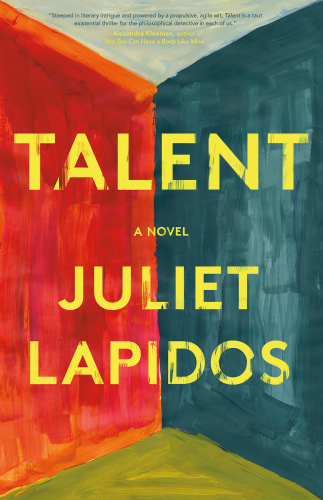
Talent
کتاب های مرتبط
- اطلاعات
- نقد و بررسی
- دیدگاه کاربران
نقد و بررسی

October 8, 2018
In her snappy debut, Lapidos questions cultural obsessions with productivity and maximized potential that date back to Jesus’s parable of the talents. A graduate student at Collegiate University (a thinly veiled Yale) and on the cusp of 30, Anna struggles to complete her languishing dissertation on artistic inspiration, already looking ahead to “the life of a professor emerita” before her career has even begun. A chance encounter with Helen Langley at the grocery store puts her in “physical proximity to genetic proximity to fame”: Helen is the niece of Frederick Langley, a deceased author of some renown who stopped writing after a promising early career. Helen is involved in a legal battle with Collegiate over its possession of Langley’s unpublished notebooks, which the idling graduate student hopes to mine for material to kick-start her dissertation. The novel proceeds briskly as Anna delves into Frederick’s papers to explain his premature retirement and as the impoverished Helen angles to secure the valuable manuscripts. Anna’s voice is sharp and humorous, capturing the jaded graduate student’s mix of posturing, snark, and self-loathing, but Frederick isn’t as enigmatic as he’s intended to be, and his scheming niece Helen is insufficiently drawn, which weakens the pull of the literary mystery. However, the novel is redeemed by its intelligent musings on the responsibilities of literary culture: what do talented authors owe their readers and themselves?

November 1, 2018
A satiric campus novel from an editor at the Atlantic.Anna Brisker is a disappointment to her wealthy, status-obsessed parents and to her thesis adviser at Collegiate, who feels she's not taking her dissertation, "an intellectual history of inspiration," seriously. But when Anna unexpectedly crosses paths with Helen Langley, the disinherited niece of an author who famously stepped away from the limelight, she uncovers a way to finish her dissertation and show up her family. According to Helen, Freddy Langley didn't have writer's block prior to his death but continued writing long after he disappeared from public view. If Anna can access Freddy's notebooks, she could finish her dissertation and earn back the respect of her adviser. Soon, Anna is embroiled in a game of literary detection that's spurred, like all good detective stories, by a combination of curiosity, lust, and petty revenge. Does Helen actually have feelings for Anna, or is it all an act? Can Anna outwit the other Ph.D. student sniffing around her project? And is it ever possible to determine an author's intentions by reading the record they've left behind? In her debut novel, Lapidos writes a scathing come-up of academia and criticism, poking fun at Ivy League hangers-on and book critics alike. In Anna, Lapidos has created a dry and distant narrator with a penchant for Pop-Tarts and metacriticism. Although the novel is often wry and observant, the philosophical puzzle at the heart of the book feels hollow, with little at stake beyond inviting readers to judge characters designed to be harshly judged. Both Anna and Helen have the privilege to stand at a remove from art and critical production thanks to the intervention of family money. But ironic distance only takes criticism--and art--so far.In this absurdist literary mystery, everyone's motives are suspect and open to interpretation.
COPYRIGHT(2018) Kirkus Reviews, ALL RIGHTS RESERVED.

December 1, 2018
DEBUT Anna Brisker, a 29-year-old grad student at a prestigious Connecticut university, has only to complete her dissertation to earn her PhD, but her adviser thinks her work "too thin" and urges her to find a case study to illustrate her argument. Then she meets Helen, niece of author Frederick Langley, who wrote three popular books as a young man and then stopped writing altogether. He seems like the perfect subject, but there doesn't appear to be any substantive research material available. Helen, however, reveals that the university's rare books library has two unpublished notebooks that belonged to Langley and plays on her sympathies by claiming that she really owns the journals but can't afford to fight the university in court. She also claims that Langley never wanted the contents of the notebooks to become public. What should Anna believe, and what should she do? VERDICT Lapidos has created a funny, ironic, and witty first novel whose main character is a parody of every graduate student ever. Alternating between Anna and the contents of the Langley notebooks, the multilayered stories keep readers guessing, appealing to general fiction readers, especially those with any background in academia.--Joanna Burkhardt, Univ. of Rhode Island Libs., Providence
Copyright 2018 Library Journal, LLC Used with permission.

November 15, 2018
Anna, a seventh-year graduate student studying English, can't seem to finish her dissertation: an intellectual history of inspiration. Instead, she spends her days utterly uninspired, eating Pop-Tarts and leaving her apartment only to meet with her advisor or shop for groceries. By sheer happenstance, she meets Helen, the niece of legendary author Freddy Langley, who wrote three incredibly successful novels in his youth and remained uninspired for the rest of his life. Helen gives Anna private information about her uncle's latter years, and his journey as a writer gives Anna the perfect case study for her thesis. Unveiling more about Freddy through his exclusive notebooks becomes Anna's primary focus?and her inspiration?but it soon becomes an obsession that ultimately leads her to criminal intrigue. Los Angeles Times editor Lapidos' literary prowess is evident in this brilliantly witty and humorous debut. The novel's layers explore the dangers of interpretation and the varying perceptions of one's, and others', intentions, all of which come together to make a thoroughly enjoyable read.(Reprinted with permission of Booklist, copyright 2018, American Library Association.)

























دیدگاه کاربران